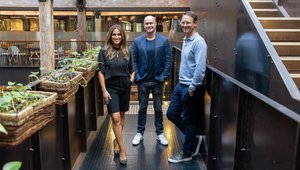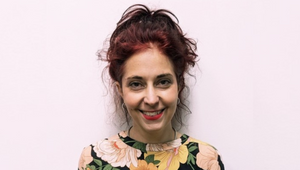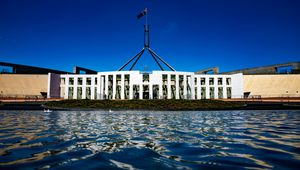
Stephen de Wolf: Small Budgets Aren’t An Excuse For Small Ideas

Stephen de Wolf believes the Australian and New Zealand advertising market needs to stop using small budgets as an excuse for selling in, and making, small ideas, and instead reclaim its reputation as a world-leader for commercial creativity.
While the year has been marred by shrinking marketing budgets, declining ad spend, and a cost of living crisis crunching consumers, BMF’s newly-minted chief creative officer doesn’t believe those factors explain the drop in creative standard that has seen Australia fall out of the Cannes top 10.
“Budgets as an excuse? No,” he tells LBB in his first interview since starting in the new role in August. “We’ve never had the budgets the rest of the world have had. We’ve always had to do more with less.
“We need to be harder on what great actually is. I think we’re very quick to feel good about ourselves here. If we’re all doing truly great work, all ships rise, but we need to be honest about what that bar is.”
He joins a chorus of voices rallying the industry to return to creative excellence, including Omnicom Advertising Group global CEO Troy Ruhanen and Telstra chief marketing officer Brent Smart.
The latter said last month, “I can't think of the last time we had a Dumb Ways to Die, a Meet Graham, like a big, massive idea where the world was looking to Australia.”
Eight years after its launch, Clemenger BBDO’s Meet Graham is still widely-referenced as an example of local creativity at its best. Wolfie was creative director at Clems Melbourne at the time, leading the idea alongside his creative partner Evan Roberts, now the CCO at TBWA\Australia.
He says the enduring conversation around that piece of work proves that when a client is presented with a truly special idea, they’ll buy and protect it; “big and great ideas aren't that hard to buy, because when you see them, you have a visceral response.”
“Brave is keeping that idea intact to the very end. Brave is fighting every fight to keep that idea pure so the world sees it the right way. But one thing that we've always been as an industry is being very, very good at doing a lot with not much. That's not new for us. That's actually what's defined us on the global stage.”
The question the industry should ask itself instead is, “Are we actually presenting great work to our clients? Because it is easy to say clients aren't buying anything. Meet Graham's a great example, where when the client saw that, everything happened to make that happen.”
The rest of the world has caught up to the standard AUNZ was setting back in 2016, he continues, so the current focus on “disposable content” isn’t cutting it. Whilst Australia and New Zealand’s creativity has always benefited from the tight brief of a tight budget, brands the world over are now being forced to do more with less.
“So now they're doing the shape of work that we were doing that many years ago. And now when we're doing it, it's not as different as it used to be, and we haven't stayed interested and interesting enough to push that agenda like we used to, to go, ‘what's next’?”
Wolfie is obsessed with being “interested and interesting”. Creatives have a responsibility to immerse themselves in culture to become interesting, and to be more interested in clients.
“I've never loved creatives sitting at their desks coming up with ideas. I love it even less if they're doing that at home, because all we're seeing is our world served up to us, and it's getting smaller and smaller,” he observes.
“So we all have a job to do in forcing ourselves to be more interested in what's going on, to make us more interesting to our clients. It's our job. Our clients are busy managing their businesses and ensuring the brands are intact. Our job is to bring interest into that every day, all galvanised by a long idea, to hold it accountable, but we have to get out there and be around the people we're talking to.”
Wolfie says his own restlessness is sparked by growing up in a small place in Western Australia, and feeling motivated by the challenge of finding something bigger. After rising through the ranks to CCO at Clems, he left Sydney for London, where he was CCO at BBH (where it was easier to be interested and interesting because “culture kind of happens to you more” in London).
He returned to Australia to take up the post of national CCO at DDB Group Australia in 2021, and shifted to BMF a couple of months ago, replacing Alex Derwin, who left the agency after a lengthy stint to set up his own shop.
BMF was crowned Effective Agency of the Year and won the Grand Effie at last month’s Effies. Wolfie says the agency’s proposition to build long-lasting ideas is “actually very rare in Australia. There aren't many agencies who know how to do it.”
Inheriting an agency at peak performance is a challenge in itself - there’s pressure not to let the creative standard slip. It’s arguably harder to put your stamp on the work as quickly. But the brand platforms BMF has set up with the likes of ALDI, Tourism Tasmania (currently up for pitch), and Tennis Australia “actually makes it freer.”
“There's nothing like a tight brief. Having great, long ideas is your tight brief that then allows you to springboard and keep the ideas fresh but also relevant. I mean, it's always hard, because my standards are high. But will it be hard to do? Hopefully not.
“What I do like about all the brands we have and their long ideas, is it comes from a place of truth. That's what makes a big, grand idea authentic and true. When you have that, you can take ideas to new places and it feels right. I don't know if it'll feel as surprising as you want. It'll just feel right.”
He plans to encourage “the team to be even bolder,” and potentially play with “exploring more interactive, unexpected ways to connect with audiences.”
“My role is to make sure they [the brand platforms] don’t just stay strong but grow even more powerful and resonant with audiences.”
Wolfie spent a lot of time with CEO Steve McArdle and CSO Christina Aventi while he sounded out whether BMF was right for him, and they established whether he was right for BMF. In them, he feels like he has people either side of him who truly understand “creativity as a growth lever.”
While a job interview process is always strange, “because it’s a lot of pretend,” Steve and Christina have been everything he thought they would be. So has BMF at large. “It is what I hoped it would be, and better.”
He’s looking forward to staying as close to the work as he can. “I don’t need to get caught up in the machinations and constructs of a global business. I can be closer to the work and our clients and make meaningful difference.”
The CCO also wants the industry to be better at merchandising itself to attract the next generation of thinkers and makers. While “we have been in a lull for the last few years,” he believes the next couple of years will be key, as “diversity of thought” starts “hitting the work again.”
“Our industry needs to turn up right. Let’s stop undercutting, underselling and start uniting, growing, and sharing. I believe we can grow an industry that’s in decline if we do that, and then we will attract the diverse people and minds we need to keep this industry I love going.”















